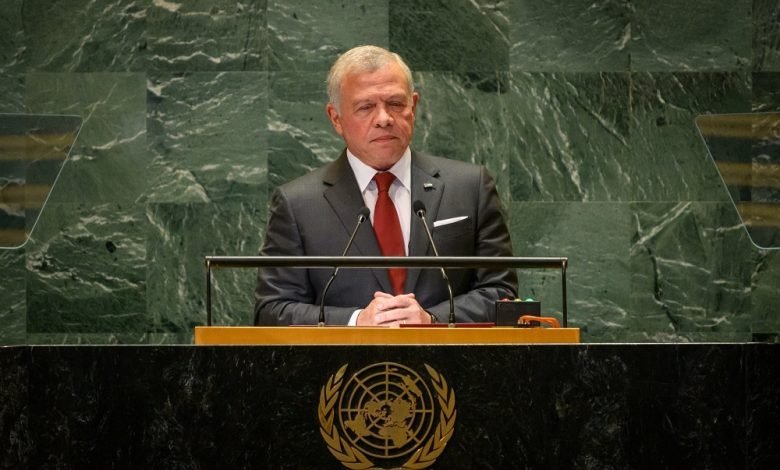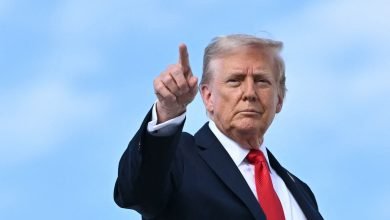
By : Nedal Zubeidi
Jordan Daily – In a speech laden with moral conviction and a rare intensity, His Majesty King Abdullah II delivered an impassioned address to the 79th United Nations General Assembly, unmasking what he described as the global community’s selective morality.
His words were not only a searing indictment of Israel’s actions in Gaza but also a poignant critique of the international order’s failure to uphold its own principles. Amidst a conflict that has now claimed over 50,000 lives, King Abdullah’s speech could mark a pivotal moment in the world’s reckoning with the war’s humanitarian catastrophe.
The King’s call for an international Gaza Humanitarian Gateway – a massive relief initiative aimed at delivering food, clean water, and medical supplies to Gaza- demands urgent attention. “Humanitarian aid should never be a tool of war,” he stated, highlighting the absurdity of aid trucks sitting idle while Gaza starves and suffers under Israeli bombardment. His message was clear: the international community can no longer stand idly by, complicit in its inaction, while the humanitarian crisis in Gaza worsens by the hour.
What makes this speech so significant is its departure from the usual diplomatic rhetoric. King Abdullah’s language was sharp, unflinching, and, above all, deeply human. He didn’t shy away from naming the horror: the unprecedented scale of civilian casualties, the killing of children, journalists, aid workers, and medical personnel. His moral outrage was palpable as he underscored the staggering toll of Israel’s military campaign on Gaza, calling into question the very values upon which modern democracies, including Israel itself, claim to stand.
“Impunity gathers force. Left unchecked, it gains momentum,” the King warned, in a subtle yet biting critique of Israel’s unchecked behavior over the past decades. His speech took aim not just at the Israeli government’s actions but at the broader complicity of the global community, which has often turned a blind eye to violations in the name of political expediency. His Majesty stressed that this war is not merely a tragic episode but part of a larger, decades-long failure to address the fundamental injustices at the heart of the Palestinian-Israeli conflict.
In one of the most powerful sections of his address, King Abdullah directly confronted the dissonance between Israel’s self-image and its actions. Israel, he argued, has long projected itself as a thriving democracy, a model of modernity in a turbulent region. But the brutality of its assault on Gaza, he suggested, has shattered that image. “The modern, advanced Israel admired from afar, and the Israel that Palestinians have experienced firsthand simply cannot co-exist. Israel will eventually be entirely one or the other,” the King declared, forcing a painful reckoning with Israel’s future as a democratic state.
What we are witnessing, King Abdullah implied, is not simply a war but the collapse of a global moral framework that has, until now, allowed certain countries to operate above international law. His critique extended beyond Israel, striking at the heart of an international order where might often supersedes right. In a world where humanitarian principles are bent at will, he asked, “what kind of world does that leave us with?”
Jordan’s position in the Gaza conflict has been unique. Over the past year, the country has consistently offered relief to the embattled Palestinian enclave, sending aid trucks, setting up field hospitals, and partnering with international organizations to ensure that humanitarian assistance reaches those in need. Yet despite these efforts, the situation in Gaza has only deteriorated, leaving the King to issue an urgent plea for global action.
It is impossible to ignore the weight of history in King Abdullah’s words. As the son of King Hussein, who spent a lifetime pursuing peace in one of the world’s most volatile regions, Abdullah’s leadership embodies a continuation of Jordan’s long-standing commitment to regional stability and human dignity. “Like him, I refuse to leave my children, or your children, a future we have given up on,” he said, invoking a generational responsibility that extends beyond political borders.
His plea for a two-state solution, grounded in international law and human rights, may seem like a return to familiar ground. But it is precisely the urgency and gravity of the current situation that makes his reiteration so powerful. At a time when global powers appear more divided than ever, King Abdullah’s call for renewed commitment to peace- and for holding nations accountable to the same moral and legal standards- resonates deeply.
The King’s speech, however, was not just a reflection on Israel’s actions. It was also a warning about the dangers of regional escalation, pointing to Lebanon’s own precarious situation. “No country in the region benefits from escalation,” he reminded the Assembly, a stark reminder that the fires ignited in Gaza could easily spread across the Middle East.
As we face one of the most critical humanitarian crises of our time, the world cannot afford to ignore King Abdullah’s call. His appeal was not only for immediate relief but for a return to the values that define our shared humanity- values that have been tested, strained, and too often betrayed in the pursuit of political gains. As he so eloquently put it, “Our humanity must not fail the people of Gaza any longer.”
In this defining moment, the question is not only whether the world will act, but whether it will finally heed the moral imperatives that King Abdullah has so powerfully articulated. The lives of millions hang in the balance. So too does the integrity of the global order.

